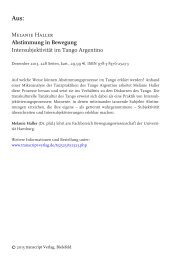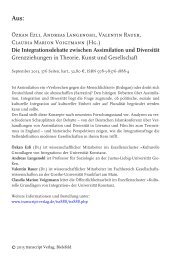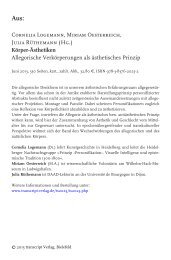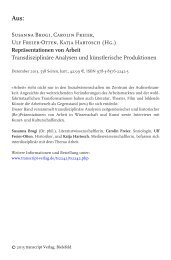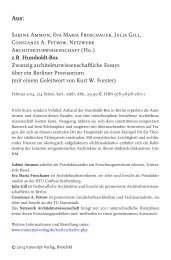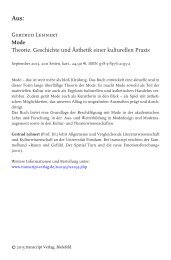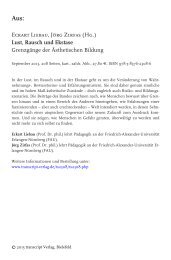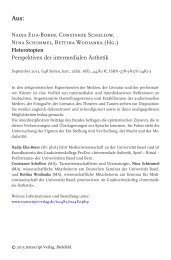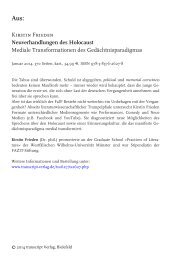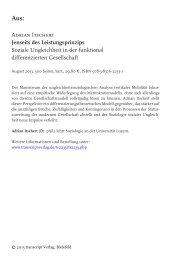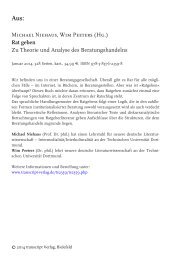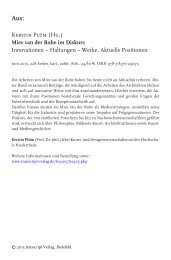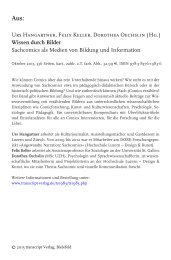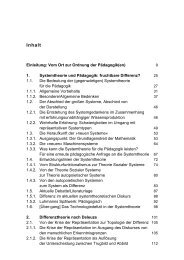Rainer Geissler, Horst Pöttker (eds.) Media ... - transcript Verlag
Rainer Geissler, Horst Pöttker (eds.) Media ... - transcript Verlag
Rainer Geissler, Horst Pöttker (eds.) Media ... - transcript Verlag
Create successful ePaper yourself
Turn your PDF publications into a flip-book with our unique Google optimized e-Paper software.
<strong>Horst</strong> <strong>Pöttker</strong> | Successful Integration?<br />
The question remains, what media and journalism might learn from this<br />
historical counterexample in terms of a possible contribution to the process of<br />
intercultural integration. Any generalizations that could be drawn from this<br />
example would perhaps be very limited: Poland’s territorial divisions and the<br />
lack of a national government for more than a century provided fertile<br />
breeding ground for separatist and nationalist tendencies in the Polish migrant<br />
community. Under more favorable conditions, the detrimental effect on<br />
integration could have been less serious. On the other hand, this historical<br />
example also involves positive factors, such as the German citizenship of many<br />
of the migrants. At least this combination of both positive and negative factors<br />
would seem to make generalization to a certain extent justifiable.<br />
In this sense, then, the largely unsuccessful integration process of the<br />
Ruhr Poles can be instructive for the media in two ways. First, the example<br />
demonstrates that if the media ignore immigrant communities and their ethnic<br />
differences, this will not promote integration. On the other hand, it is apparent<br />
that intercultural integration is furthered if journalists take their job seriously<br />
and comprehensively report on the everyday life of ethnic minorities with<br />
accurate and authentic material. Second, it is detrimental to intercultural<br />
integration if ethnic media only perceive hostile elements in the majority<br />
culture and attempt to prevent their minority audience from communicating<br />
and interacting with the majority in positive ways. Moreover, journalists<br />
working in ethnic media can contribute to integration if they make sincere<br />
efforts to provide publicity for their audience’s concerns. For migrant<br />
audiences, this also means that the accommodating society should naturally<br />
have a place in this media constellation.<br />
6. References<br />
Burghardt, Werner (2000): “Die polnischen Arbeiter sind...fleißig und haben<br />
einen ausgeprägten Erwerbssinn…“ – Zur Geschichte polnischer Bergarbeiter<br />
in Recklinghausen 1884-1924. In: Bresser, Klaus/Thüer, Christoph,<br />
<strong>eds</strong>.: Recklinghausen im Industriezeitalter. Recklinghausen, pp. 401-<br />
423<br />
Durkheim, Émile (1977): Über die Teilung der sozialen Arbeit. Frankfurt a.M.<br />
Geißler, <strong>Rainer</strong>/<strong>Pöttker</strong>, <strong>Horst</strong>, <strong>eds</strong>. (2005): Massenmedien und die Integration<br />
ethnischer Minderheiten in Deutschland. Problemaufriss – Forschungsstand<br />
– Bibliographie. Bielefeld<br />
24



